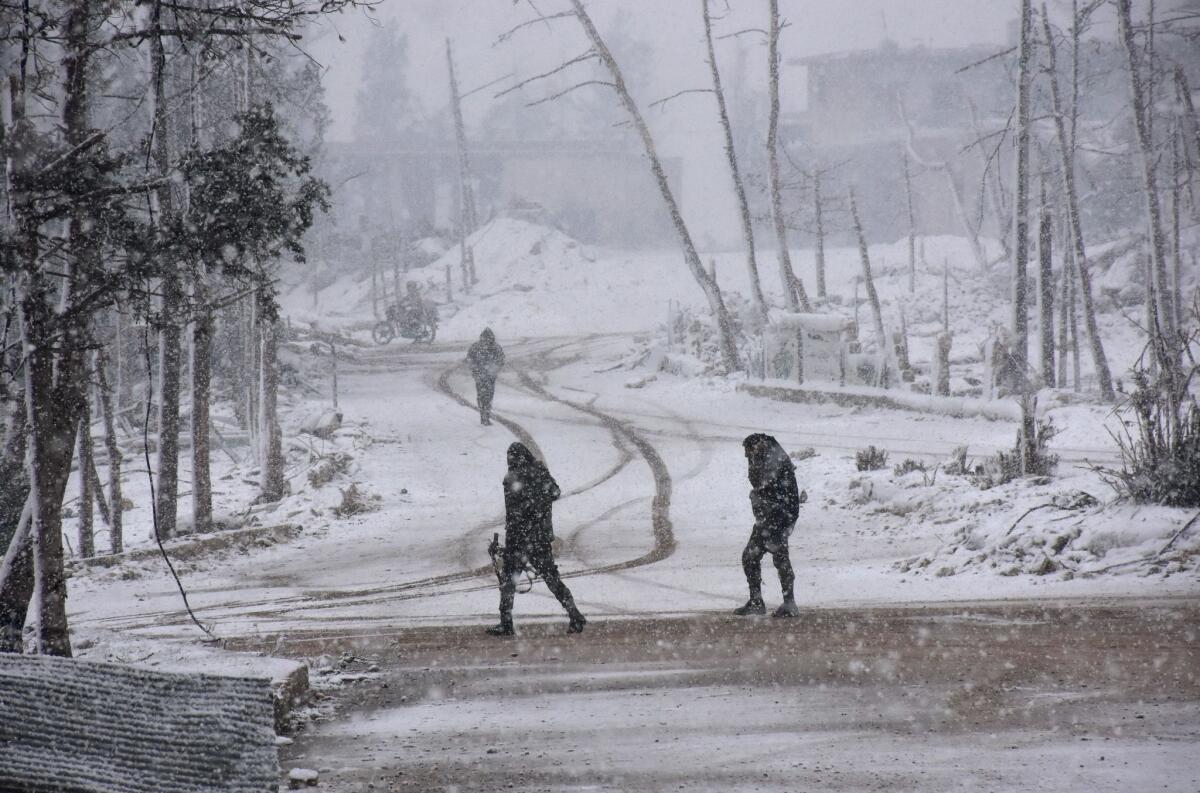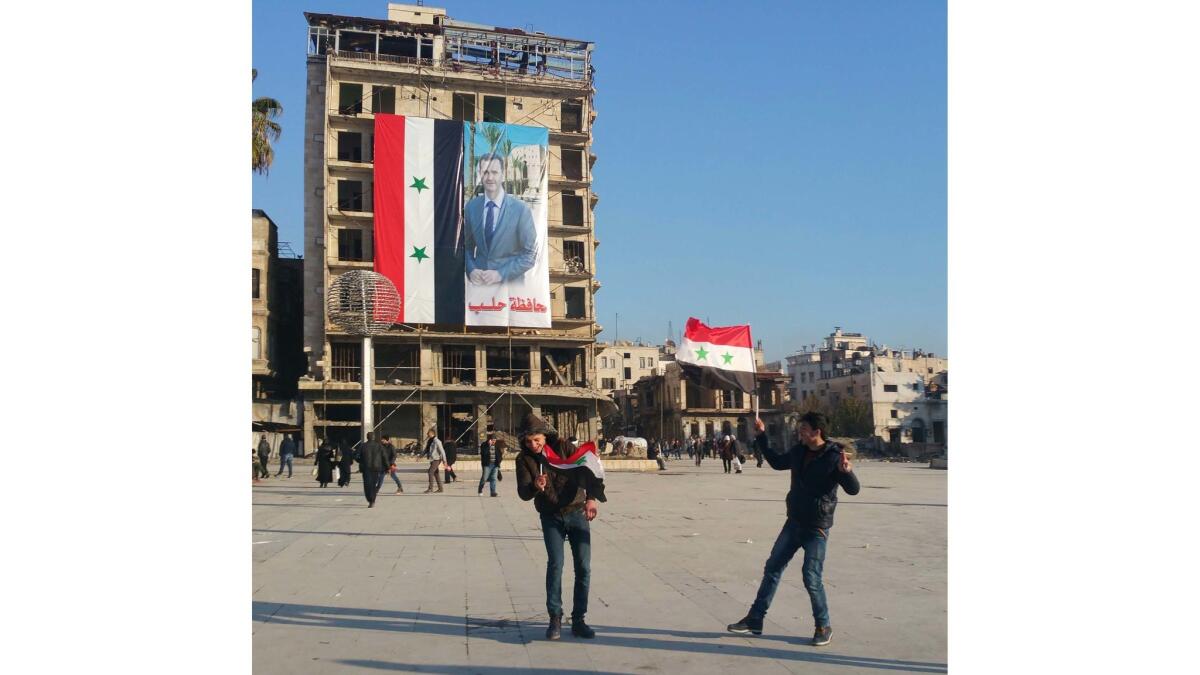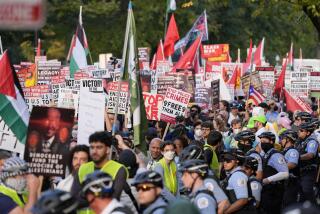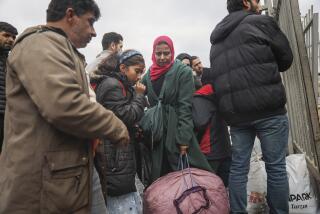Assad supporters celebrate victory over Aleppo as last rebels are evacuated from the city

For the first time since the Syrian civil war came to Aleppo in 2012, the city was holding a Christmas tree lighting ceremony.
Shadi Hulwe, a prominent pro-government reporter who hosts a weekly show from this embattled city, appeared on a stage set up before the two-story high tree in the middle of Aziziyah square. Dozens of people gathered around sent up a rousing cheer.
Hulwe fired up fans with his catchphrase, “Here’s Aleppo!” before a DJ blasted the opening strains of a popular song. The crowd responded with a paroxysm of activity, the men dancing a frenetic dabke step as others waved Syrian and Russian flags.
Some of those gathered hoisted Joseph Fannoun, a 55-year-old jeweler, onto their shoulders. He waved the green-on-yellow banner of Lebanese Shiite group Hezbollah, an important ally of Syrian President Bashar Assad, above his head.
“Is it possible a nation can have more than 80 countries fighting it and yet it is the one who wins?” Fannoun asked.
“Syria is a country that God has protected.”
The ceremony was the latest in a series of large-scale public spectacles staged on Tuesday to celebrate the government’s victory over the rebels in Aleppo.
Earlier on Tuesday, large crowds had filled the Basel stadium in Aleppo, named after Assad’s older brother, who was killed in a car accident in 1994.
Officials sat before small tables adorned with bouquets, chatting and intermittently listening to a youth choir work its way through a bevy of patriotic songs.
The event culminated with a poem fervently extolling the might of the Syrian army, recited by university student Mustafa Akdaa.
“Our flag waved in Sheikh Saeed and Ramousseh. Now it has risen in Shaar,” he declared, referring to neighborhoods that were once part of the rebels’ pocket in east Aleppo.
“There are no men among the Arabs, except the lions of Syria.”
Once the rally had ended, people thronged to Saadallah Jaberi square, where a large Syrian flag fluttered languidly atop a roughly 90-foot mast.
“We couldn’t walk here in the past … too many snipers,” said one off-duty soldier, who refused to give his name for reasons of privacy.
Around him, people posed for selfies. Nearby, a pair of boys mock-jousted with the Syrian flags they carried.

The carnival-like atmosphere formed a stark counterpoint to the rebels’ final days in the neighborhoods that made up what they had dubbed “Free Aleppo.”
Forced to seek shelter in crumbling structures repeatedly pounded by fighting, those remaining in the shattered pocket burned whatever detritus they could find to fend off the bitter cold.
They waited for the resolution of torturous multi-sided negotiations to ensure their safe passage to the rebel-held province of Idlib, while also taking approximately 4,000 people from Fuah and Kfarya, a pair of Shiite-dominated towns that are besieged by Islamist factions.
By Wednesday, however, 60 buses had gone in once more to shuttle fighters out. Ahmad Qara Ali, a spokesman for the Islamist faction Ahrar al-Sham, said the evacuation would end on Wednesday.
Several residents in Fuah and Kfarya, however, said that only one wave of evacuees had left the two towns. According to Mohammad Hassan Taqi, head of the Fuah and Kfarya’s Crisis Committee, heavy snowfall had prevented buses from taking residents out.
The Syrian Observatory for Human Rights, a pro-opposition monitoring group, reported Wednesday that “the final wave of those besieged inside the area of rebel control” had left Aleppo, and that the government had regained full control of the city. Syrian state media and pro-government outlets, however, stated evacuations had resumed but did not say they had ended.
Assad’s victory over the rebels, achieved after a punishing campaign that saw fighters from Lebanon, Iraq, Iran and Afghanistan battling alongside Syrian army troops, with air and modest ground support from Russia, establishes government control over all of Aleppo, Syria’s largest and arguably most important city.
Earlier this month, most of east Aleppo’s residents streamed into government areas during the army’s onslaught.
But an estimated 50,000 people, fearful of being punished for their anti-government views or of being pressed into service in the security forces, burrowed ever-deeper in rebel neighborhoods.
Their plight spurred a bout of negotiations between Russia and Turkey that would grant them safe passage to Idlib. But the evacuation was almost immediately derailed, with the two sides blaming each other for the collapse.
Though a major setback, the loss of Aleppo does not signify the end of the opposition’s battle against Assad. Rebel ranks are dominated by hard-line Sunni Islamist factions, and many view the war as an apocalyptic fight against Shiites, members of another branch of Islam.
Even as pro-government Aleppans promenaded around the Christmas tree, the festivities were marred by what state TV said was an explosive canister that detonated nearby. In its wake, security personnel searched the bags of those attending, while prominent city figures, including several of Aleppo’s Christian clergymen, departed from the area.
Meanwhile, on Wednesday, users on social media shared a video depicting a bearded man, thought to be a member of the Front for the Conquest of Syria, Al Qaeda’s former affiliate in Syria, named Abdul Rahman Shaddad.
Shaddad speaks to his daughters, 9-year-old Fatemah and 7-year-old Islam, both dressed in black hijabs.
The video could not be independently verified, but it appeared days after a Friday suicide bombing in the capital, Damascus, when a child, now thought to be Fatemah, had blown herself up in a police station.
“Fatemah, what are you going to do today?” asks Shaddad.
She answers that she will carry out a suicide mission in Damascus.
“You want to surrender so that you’re raped and killed by the infidels?” he asks.
Fatemah says no.
More to Read
Sign up for Essential California
The most important California stories and recommendations in your inbox every morning.
You may occasionally receive promotional content from the Los Angeles Times.









